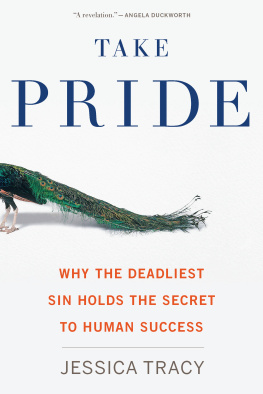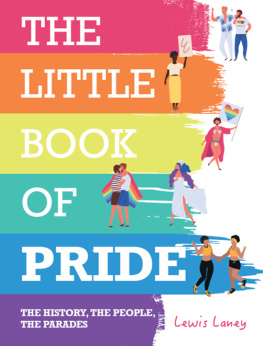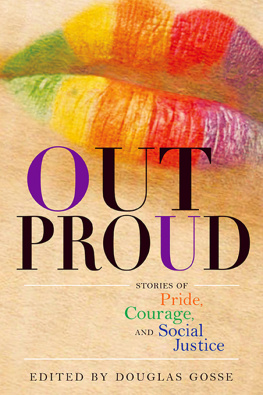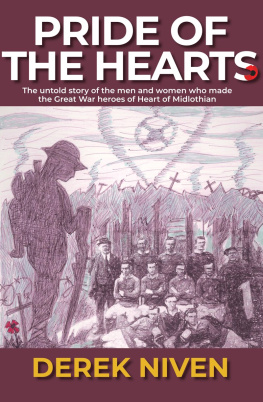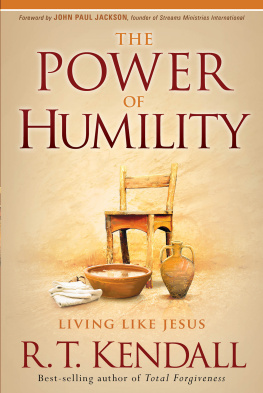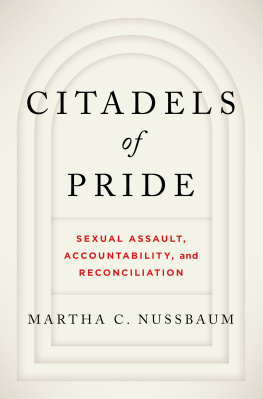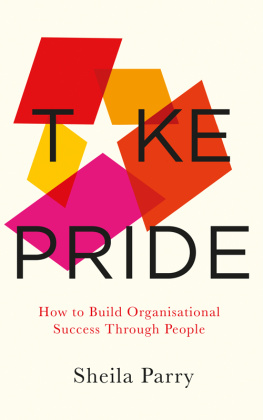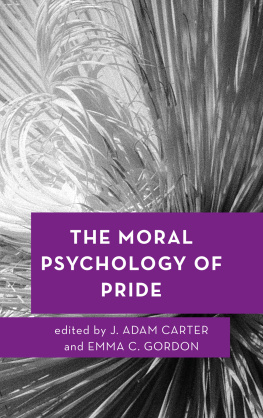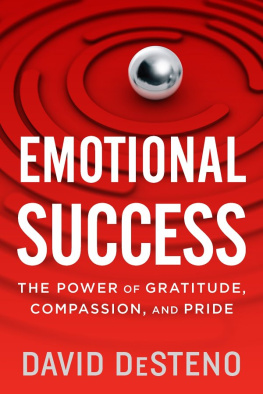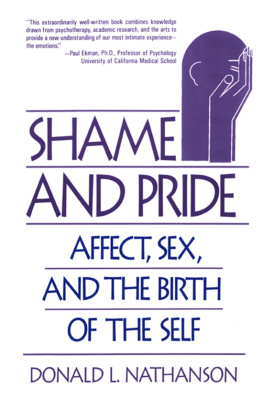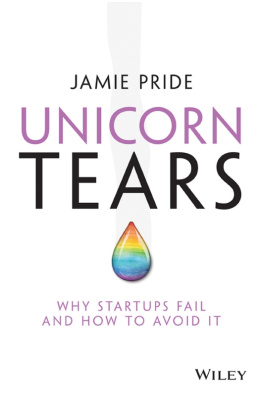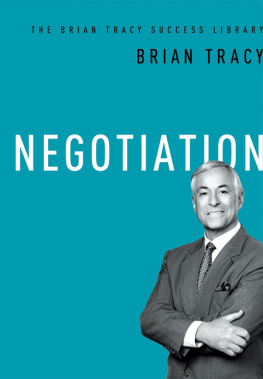Copyright 2016 by Jessica Tracy
All rights reserved
For information about permission to reproduce selections from this book, write to or to Permissions, Houghton Mifflin Harcourt Publishing Company, 3 Park Avenue, 19th Floor, New York, New York 10016.
www.hmhco.com
Library of Congress Cataloging-in-Publication Data
Names: Tracy, Jessica L., author.
Title: Take pride: why the deadliest sin holds the secret to human success / Jessica Tracy.
Description: Boston : Houghton Mifflin Harcourt, 2016
Identifiers: LCCN 2016004635 (print) | LCCN 2016014096 (ebook) | ISBN 9780544273177 (hardback) | ISBN 9780544273085 (ebook)
Subjects: LCSH: Emotions. | Pride and vanity. | Social psychology. | BISAC: PSYCHOLOGY / General. | PSYCHOLOGY / Social psychology. | PSYCHOLOGY / Emotions. | SCIENCE / General.
Classification: LCC BF 511 . T 73 2016 (print) | LCC BF511 (ebook) | DDC 152.4 dc23
LC record available at http://lccn.loc.gov/2016004635
Illustration credits appear on .
Cover design by Martha Kennedy
Cover photograph Jerry Young/Getty Images
v1.0816
For Harper, who gives me pride every day
And, also, for Kristin
Preface:
The Most Human Emotion
I N 1885, the painter Paul Gauguin suffered what might be considered the fin-de-sicle version of a midlife crisis.
It had been a long time coming. For eleven years, Pauls wife, Mette, had tolerated her husbands blatant lack of interest in the high-society life she thought shed married into. When they got engaged, he was a French stockbroker with solid family connections and a promising future; she was a Danish tutor, eager for something better. With Paul, shed thought, she could raise a family and join the ranks of the bourgeoisie. And, by all appearances, she had done exactly that. After the birth of their first child, the couple moved from their cramped apartment in central Paris to a larger home in the sixteenth arrondissementat the time an up-and-coming neighborhood on the outer edge of the city. Seemingly happy, they lived a life of apparent suburban bliss, eventually having four more children.
But for Paula salesman who had always been far more interested in the world of art than the world of businesssomething was missing. Almost immediately after moving to the outskirts of Paris, he began taking every opportunity he could find to sneak off to the gallery openings and impressionist art shows that were regular occurrences in the more bohemian corners of the city. Eventually, his craving for this other kind of life completely consumed him.
In 1885, Paul Gauguin took the plunge; he quit his day job and became a full-time artist. He left his wife and children to fend for themselves while he lived in poverty on the streets of Parisand, later, in Panama and Martinique. Over the subsequent years, he suffered a range of ills: malaria, dysentery, depression, chronic pain from a never-healed ankle injury, and syphilis. Life as a starving artist was not easy or pain-freenot for Paul or for the people who had previously depended on him. But in choosing that life, Paul Gauguin became the person he had always wanted to bea person whose paintings now hang in museums all over the world.
Many of us have experienced this same sense of dissatisfaction that Gauguin felt in his married life with Mette. Like him, we may have already achieved certain successes; maybe a job that pays well, a comfortable home, or a supportive and loving family. But despite it all, we know that something is missing. We might be craving greater respect from our peers or others we admire. Or perhaps we hunger for a way to feel like were accomplishing something that has some impact on the world. Whatever it is we are missing, in order to find it, we need to change our lives. We need to sacrifice the ease and stability weve managed to secure for the potential of something better: the chance to create, or become, something meaningful.
Almost two decades ago, I experienced this same feeling, a sense that something was missing from my life. It was 1997, and I had recently graduated from a small liberal arts college in New England and moved across the country to San Francisco with five friends. My aim had been to explore the West Coast and take a break from the constant stress of exams and paper deadlines before embarking on my real, adult life. I found a job as a barista in a local caf, where I learned to make lattes and a mean tuna bagel. I had become friends with the regularsmostly artists and writersand with the cafs owner, who would come upstairs from his basement printmaking studio each day around three to split a chocolate chip cookie. The tips were generous, the job couldnt have been more anxiety-free, and the conversations I had with my coworkers and the caf clientelealong with the abundant reading time I found between the lunch and happy-hour rushesprovided just enough intellectual stimulation to prevent my brain from atrophying.
By many measures, life was good. But about a year in, I felt something stirringsomething like what Gauguin must have felt during all those years of forcing himself to try to succeed in business. People from across the neighborhood would come to the caf requesting my soy lattes, but my life was lacking.
I missed something that Id had in college. It wasnt the beer-soaked dance parties, or the ready availability of any number of close friends, or the peacefulness of life on a rural and secluded Massachusetts campus. It definitely wasnt the snow. What I was missing during those long, quiet San Francisco afternoons were the late nights spent in my colleges mid-1990s computer room as three friends and I madly rushed around trying to pull together the political newsmagazine wed founded. I was missing the feeling I had those nights as I anxiously triple-checked that the right kind of paper was loaded into the dot-matrix printer, drove to the twenty-four-hour Kinkos, and scrambled to copyedit.
I missed working hard with other people who cared about something that felt larger than ourselves. During those long days of perfected soy lattes, I was missing the feeling of pride I experienced from creating that magazinethe feeling of building something that seemed important.
Im not talking about the feeling I had when I saw our first completed issue of the magazine dispersed all over campus. I wasnt missing the feeling of pride in a job well done or of basking in others (remarkably restrained) appreciation of the magazine. What I was missing was that late-night, hard-working, knowing-we-were-doing-something-we-cared-about pride, which had no equivalent in my San Francisco barista life.
The absence of that pride made me realize that my break was over, and it was time to begin my real life. The desire to feel pride again prompted me to apply to graduate school, where, sure enough, I came to experience that feeling of working hard toward something I cared about on a daily basis.
Pride kick-started my career, and its what kick-starts the career of all people who find a way to do something they care about or that fills their lives with meaning. This desire for pride is the motivation that underpins ambition. In her memoir Not That Kind of Girl, writer/actor/director Lena Dunham reports experiencing the very same feeling in her early twenties in the midst of an easy and pleasurable life filled with friends and parties and freedom. Ambition is a funny thing, she writes. It creeps in when you least expect it and keeps you moving, even when you think you want to stay put. I missed making things, the meaning it gave this long march we call life.
The desire for pride creeps in and manifests itself in different ways. For Dunham and me, it meant abandoning our bohemian lives and hourly-pay jobs to pursue paths that felt bigger and better; for Gauguin, it meant abandoning a bourgeois life to seek out something more bohemian. For others, the desire for pride might mean starting a family, taking a dance class, applying for a promotion, or training for a marathon. And for still others, it might mean reckless, even self-destructive behaviors, like cheating on an exam, doping before a race, or taking credit for someone elses accomplishment.
Next page
